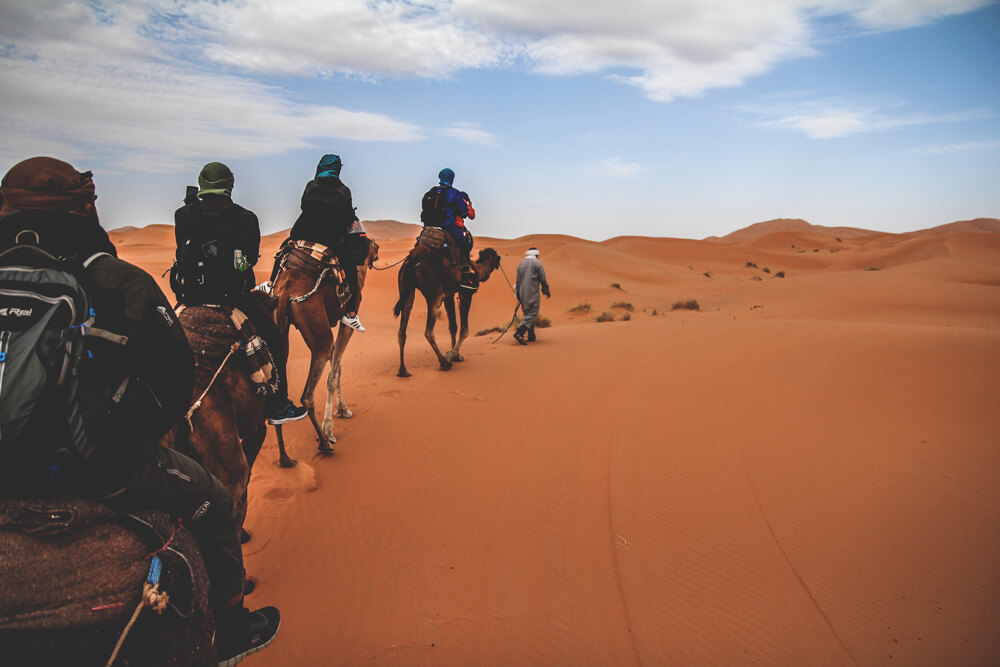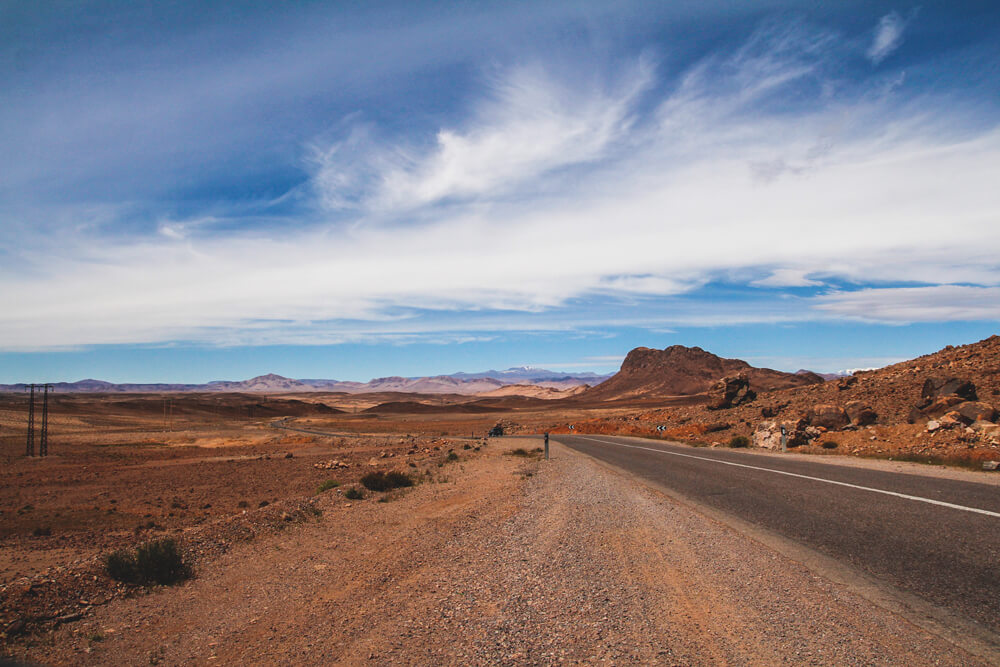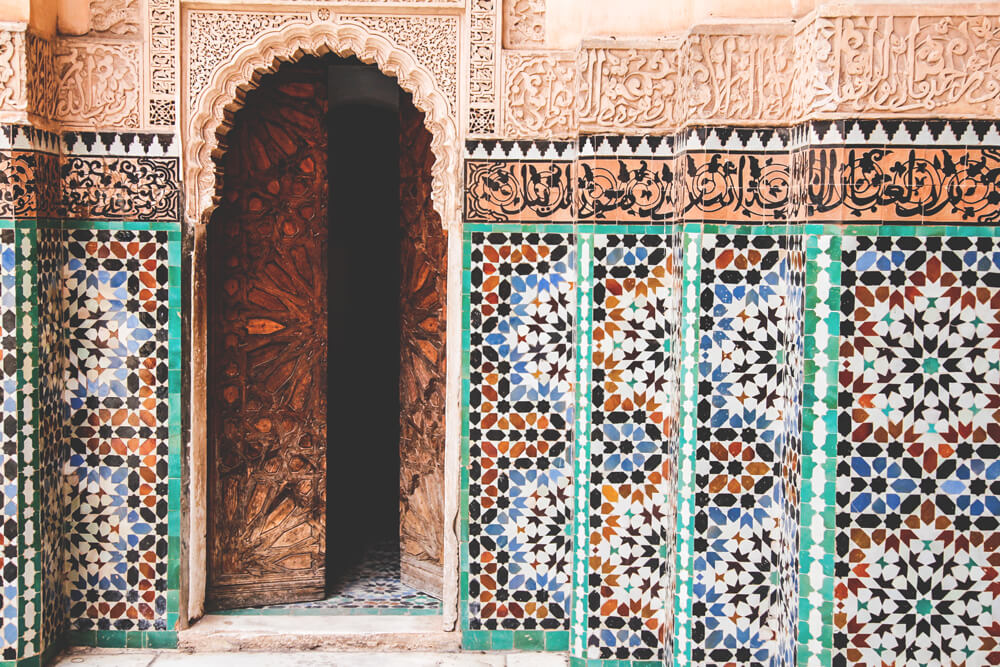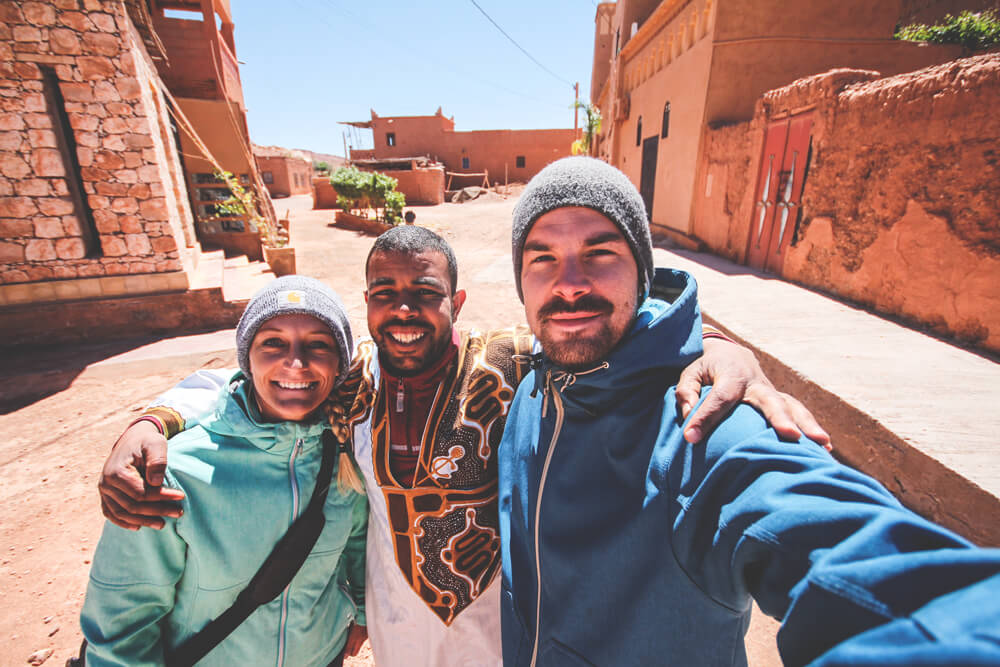Dear globetrotters, many of you asked us about safety in Morocco. We hadn’t even considered this question before our tour. We had no concerns from the start. The only thing we asked ourselves was: “What are the roads like in the country? Gravel roads and potholes?” Otherwise, we’ve never really given much thought to safety in Morocco, even though there have been terrorist attacks in the past. After our trip through the country, we can give you some helpful information on this topic.
You should also know:
- Best time to travel to Morocco
- Sights in the country
- Entry & Visa for Morocco
- Currency & Budget
- Morocco Round Trip & Tips
- The most beautiful riads
- Important travel insurance
- Our complete photo equipment
- The best travel credit cards
- Our Morocco route
- You should also know:
- What does the Federal Foreign Office say about safety in Morocco?
- Crime in the country
- How safe is it in Marrakech and other cities?
- Is it safe to drive a rental car yourself?
- Religion in the country
- Homosexuality and prostitution
- Safety in Morocco – Tips for your trip
What does the Federal Foreign Office say about safety in Morocco?
When we research such topics, we always check the Federal Foreign Office website first. They say that Morocco is a politically stable country with a good tourism and security infrastructure. The Federal Foreign Office recommends against traveling to remote areas of the Sahara. Travel to the border regions of Algeria and Mauritania is particularly strongly discouraged.
Tourist routes to Zagora or Erfoud are not affected. Off-road tours should only be undertaken in a group and with a Moroccan guide. We took a guided tour of the Sahara from Merzouga, and it was AMAZING! We met only friendly and interesting people. Safety in Morocco was absolutely assured during our trip.
Harassment can also occur in the Rif Mountains. Cannabis is cultivated there. Please do not travel this area alone, and especially do not buy drugs. Drug possession is a criminal offense in Morocco and can lead to painful prison sentences.

Risk of terrorist attacks
There is a risk of terrorist attacks with an Islamist background, which appear to target foreign nationals more frequently. It is also said that the unstable security situation in the North African, Sahel, and Middle Eastern regions could also affect Morocco. Propaganda, demonstrations, etc., can also develop spontaneously and, above all, unexpectedly. It is therefore advisable to avoid such demonstrations and crowds.
In April 2011, a bomb exploded in Marrakesh, killing 17 people and injuring several others. There were also attacks in Casablanca in 2003 and 2007. We don’t mean to scare you, just to point out the past. Since then, however, the country has fortunately remained quiet. However, we all know that such attacks can happen anywhere today. Just look at the horrific attacks in Europe and around the world in the past! In the end, nowhere is 100% safe anymore. But we shouldn’t let that intimidate us!
Crime in the Country
As in many other countries around the world, theft is a common occurrence, especially in the big cities. Robberies can happen at any time. We didn’t notice any of this, neither in Marrakech nor anywhere else in Morocco. We never felt unsafe or threatened. Nevertheless, we heard that in some robberies, stabbings were even used against tourists. Prolific! But as I said, we never heard of it.
It’s also worth mentioning that crime in Morocco is very low compared to other European countries. Often, it’s unemployed young people, alcoholics, or drug addicts who are willing to commit such acts to satisfy their cravings with the money. What we did notice: you’re often offered drugs, and Moroccans try to sell themselves as tour guides. You should be careful here; they’re real crooks! Reject these services confidently and confidently. Be careful with drugs!
People often try to sell you drugs, only to then report you to the police. They’re all in cahoots! Someone might even tell you that your bus or train ticket is invalid. These fake “ticket inspectors” will want you to pay extra. Don’t let anyone talk you into it! Before you start your journey at the train station, you can ask the station staff about safety in Morocco.
How safe is it in Marrakech and other cities?
Many tourists either travel only to Marrakech or visit this city as part of a tour. Marrakech is definitely one of the most popular travel destinations in Morocco. And so, many people here ask themselves: “Is a trip to Marrakech safe?” We generally had no problems in Marrakech and never really felt unsafe. Of course, some of the alleys were occasionally creepy. But: It’s a different country, different people, and different cultures. In any case, safety in Morocco was assured in most cases.
We were frequently offered drugs, and once we were even harassed in a really rude manner by a young Moroccan man. We were looking for our riad, and he offered to help us and take us there. Since we already knew the scam, we politely declined. He then became quite angry and followed us through the alleys the whole time. We didn’t understand his words, but we no longer felt comfortable.
Money, Drugs, and Pride
“This is my area!” was what we had to listen to the whole time. He looked very aggressive and was probably on drugs. The next day, our driver told us that the area around the Bahia Palace wasn’t the best. There are a lot of drug addicts around there who want money for their drugs. So be careful! Not everyone just wants to be friendly and helpful. They just want your money! It’s a shame, but that’s how it goes there every now and then.

In Marrakech and other places, you’ll increasingly see armed police and security forces. They’re an integral part of the cityscape; you’ll have to get used to it. They patrol especially in front of tourist attractions, bus stops, and train stations. At least this gives you a basic feeling of security. After all, the terrorist attacks of recent years have led to people appearing in public more often.
Pickpockets are everywhere – not just in Morocco. Fortunately, we weren’t victims of these little sleazy criminals. Nevertheless, you should keep your eyes open as you walk through the streets. It’s best to leave your valuables at home or in your hotel. You should carry your backpack on your chest, not unattended on your back. It’s best to take a small bag with you and, above all, not too much cash.
We usually only had €10 to €20 in our pockets. Be careful when taking photos. We simply took a photo of a donkey, and the owner immediately wanted money from us. This is especially common in the main square, Djemaa El-Fna. You shouldn’t support monkeys with chains around their necks, helpless snakes as photo subjects, and other animal cruelty! And no one really needs a photo of this animal cruelty in their family photo album.
Is it safe to drive a rental car yourself?
We drove through the “Great South” of the country in a rental car. What surprised us was that the roads were mostly in really good condition. So we got from A to B without any problems. However, we were also given some information before the start of our tour. In the desert, you should only drive with a four-wheel drive vehicle. Most road signs are in Arabic and English.
In remote areas, there are sometimes no signs at all. However, the navigation system can help in those cases. We advise against driving through the country in the dark or at dusk. So always try to start your tours in good time. In the dark, you overlook the obstacles you’ll repeatedly encounter on the road in Morocco.

In the big cities, you should try to simply go with the flow of traffic and not let it get you down. Naturally, there are far more cars on the roads here than in the remote regions. There is no left-hand traffic in Morocco; people drive on the right.
When driving, you should always keep an eye on the side of the road. It’s not uncommon for a cow, donkey, pedestrian, goat, sheep, camel, or cyclist to cross or block your path. Drive carefully if you see potholes in the distance and take your foot off the accelerator.
Attention, police!
At police checkpoints, you should drive slowly and wait to see if the officer signals you to continue or to stop. We were always waved off and only stopped once on the last stretch. He then wrote “150” in the air and signaled to us that we were speeding. We should therefore pay 150 dirhams (15€). Of course, that was a lie!
We played dumb and asked for a receipt. He then waved us off and let us drive on without comment So be careful at such checkpoints and don’t immediately believe everything they tell you. Obey the speed limits and rules, even if there’s no one on the streets for miles around!
Religion in the Country
The state religion in Morocco is Islam. Approximately 98.7% of the population are Muslims, 90% of whom are Sunnis of the Maliki school of law. So, pay attention to religious customs. You are not allowed to enter a mosque (with the exception of the Hassan II Mosque in Casablanca and the renovated Tin Mal Mosque in the High Atlas).
During the fasting month of Ramadan, you should also be careful and restrained with smoking, eating, and drinking in public. Don’t encourage locals to drink alcohol either! Dress appropriately and avoid wearing the shortest shorts or low-cut tops. Just avoid the stares of others.

Islamic rules in Morocco
According to Islamic rules, women and men must always maintain a certain distance from one another. Hospitality is very important in Morocco. If you are ever invited, bring a small gift (sweets or toys for the kids). Be sure to take off your shoes beforehand and never show the soles of your feet, or point your feet at someone else. This is considered an insult here.
Before taking photos of other people, you should politely ask. Often, people don’t mind, but a small tip is usually expected. You shouldn’t even photograph the military! Officials and authorities are respected much more in Morocco than in other countries.
So never insult the king or other officials. Moroccans rarely speak negatively about their country – even if they are critical of the system. So refrain from making any such comments. It is even illegal to criticize the royal family! And very important, if you are on a beach in Morocco: Nudism and topless are strictly prohibited!
Homosexuality and Prostitution
You will often see Moroccan men holding hands or walking arm in arm through the streets. This has nothing to do with homosexuality but is merely an expression of friendship between men. The Islamic faith condemns homosexuality and considers it immoral. In general, there is little room for the exchange of affection in Morocco, regardless of whether it is between heterosexual, homosexual, or bisexual couples. Kissing in public is frowned upon. Men and women only shake hands.
In Marrakech, for example, you’ll find guesthouses that are considered “gay-friendly.” They’re used to gay or lesbian couples, so there’s no confusion there. Prostitution is becoming increasingly widespread. The police are now cracking down on it. If you want to get closer to locals, you should do so discreetly and always keep the law in mind. In general, however, the country is just as suitable for gays and lesbians as it is for straight people.
Safety in Morocco – Tips for Your Trip
Finally, we’d like to give you a few tips. Keep these in mind and use common sense. Morocco is a beautiful country and definitely worth a visit. Don’t let any incidents, religions, or laws intimidate you. Go out into the world and see it! It’s worth it! <3
- Travel in a group, in pairs, and not necessarily alone
- Avoid dark alleys
- Stash your important travel documents safely or in the hotel safe
- Do not store important items in the outside pockets of your backpack
- Leave valuables at home or in the hotel
- Observe traffic regulations
- Do not drive at night or at dusk
- Tipping is expected, but please not too much! This spoils the interaction with tourists.
- Do not take unauthorized photos of others (no photos of the military, etc.)
- Kisses and affection are not welcome in public
- Respect local religions – dress appropriately!
- Observe religious etiquette!
- Do not make derogatory comments about the royal family
- Avoid drugs and excessive alcohol consumption
- Beware: Fake tour guides, drug dealers, and salespeople!
- Always negotiate the price when shopping – it’s considered good manners here!
- Accept well-intentioned tips/advice/advice from locals!
- Politeness, friendliness, and common sense = THAT’S IT!
